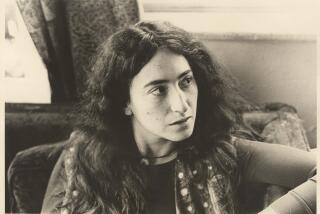Obituaries : Kay Boyle; Novelist, Anti-War Activist
- Share via
Kay Boyle, the elegant novelist and expatriate who chatted and sipped coffee in Paris with such titans as James Joyce, Gertrude Stein and William Carlos Williams, is dead at 90.
Cosette Thompson, a longtime friend, said Monday that Miss Boyle--mother of five, anti-war activist, teacher and author of about 40 books--died Sunday at The Redwoods, a convalescent home in Mill Valley. She had been living in the rustic retirement community just north of the Golden Gate since suffering a stroke.
She was a prolific author whose works ranged from memoirs of the two decades she spent in France (1923 to 1941) to several children’s books to two short stories that won the O. Henry Memorial Award in 1934 and 1941.
And her output did not dim with age. She published her last collection of poems only last year.
Two years before that, she had journeyed to Los Angeles for what was to be the last public reading of her work, at the downtown Theatre Center.
She was also a hard-edged activist who lost her teaching job at San Francisco State University in the turbulent 1960s when she referred to campus president and future senator S. I. Hayakawa as “Hayakawa-Eichmann.” The eccentric semanticist later reinstated her.
Born in Minnesota, Miss Boyle traveled widely with her family, settling in Paris and helping found the seminal literary journal Transition. She and her compatriots, including Ezra Pound, Hart Crane and Samuel Beckett, the writing comrade she would one day salute in her novel “Gentlemen, I Address You Privately,” talked the politics of the day while listening to the discourses of Pablo Picasso. She remembered Picasso as being more vocal than her writing friends.
She was married to a Frenchman (she was divorced twice and widowed once), was working to help support the two of them and had settled into the French intellectual life when World War II forced her back to the United States.
By then she had published several novels, including “Year Before Last,” “Plagued by the Nightingale” and “Death of a Man,” and had produced many of the short stories for which she may have been better known.
Although she was always a critic’s writer, she never found the widespread popularity that her contemporaries enjoyed.
“David V. Koch, in the “Dictionary of Literary Biography,” wrote that Miss Boyle “has been so busy writing and acting upon her beliefs . . . that she has had little time to cultivate a following.”
She returned to Europe after the war and was a New Yorker correspondent. During the McCarthy era of the 1950s, her third husband, Joseph Franckenstein, was dismissed from the State Department for his political views. He was reinstated in 1962 but died of cancer months later.
She began teaching at San Francisco State in 1963, rented her four-story home in the Haight-Ashbury district to students and helped organize the anti-war uprisings that swept the campus.
At age 66 she served 31 days in prison for leading a sit-in at an induction center.
She continued to labor at her craft, her output remaining constant into the 1980s and her themes, whether in poetry or in fiction, centering on the moral responsibility of the individual.
“I probably write to express a feeling of guilt,” Miss Boyle said in a 1949 interview. “I feel guilty for every act of oppression that has been committed in our time.”
A memorial service is scheduled for Jan. 9 in Our Lady of Mt. Carmel Church in Mill Valley.
More to Read
Sign up for our Book Club newsletter
Get the latest news, events and more from the Los Angeles Times Book Club, and help us get L.A. reading and talking.
You may occasionally receive promotional content from the Los Angeles Times.










